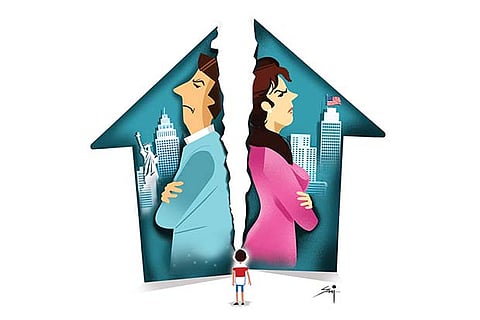Coping with aftermath of failed marriage
Chennai
Separation after marriage can be traumatic for any couple, irrespective of which part of the globe they live in, but for Indian immigrants living in the US, a failed marriage can hurt more intensely.
The problem stems from the fact that the legal proceedings takes place in a Western environment, while the values of marriage remain Indian. The aftermath of divorce is more emotional and in the absence of a precedence or a strong social support system, recovery is complicated.
Dr Priyanka Upadhyaya, a clinical psychologist who counsels couples stressed by martial relations, said “Incompatibility remains a common reason for the marital discord and the immigration policy itself fuels the situation.”
Initially, when one couple moves to the US, it is mostly the man who has the work permit, and hence a job, while the spouse ends up managing the house. The frustration of not being able to be financially independent is common among many women immigrants.
Furthermore, loss of a job or problems while handling children can also lead to emotional trauma leading to separation, said Dr Priyanka.
For many families moving to the western world, adjusting to the habits of greeting, eating, socialising and the literal American life style are easy, but when it comes to handling the home front, they continue to favour the dated Indian concept of a male-dominated marriage.
Transformation of wives to maids who slave at home, with no one to share the workload and hardly any recognition, triggers thoughts of separation. Moreover, lack of the ability to communicate in a mature manner even ends up in physical abuse, leading to a permanent damage. Of course, one cannot overlook the new crop of men who cook, clean and take care of kids, but even they can falter when it comes to compatibility. Not to speak of the “in-laws” interference even when thousands of kilometres away from them. Infidelity too finds its way in the discord list.
Once the couple decides on separation, the trauma multiples. The legal process leaves one completely drained off the little savings by paying hefty attorney fees. The alimony process is fine-tuned and legally well-implemented allowing the non-working spouse paid enough to maintain the standard of living as prevailing on the day of separation. This stresses the earning spouse to double up to provide for the “once upon a time love”, as well to the new life of freedom.
The stress on the divorced parents that have children is even more severe. Though separated, the child’s custody still keeps them interlocked. The parents have to share the child’s possession as per the court order. But, usually kids below eight get more time with the mother.
Moving away from a normal parenthood, separated couples also are under a constant pressure to keep themselves in the child’s good books. The innocent young child’s interpretation of situations is the evidence before law. Engaging a child under such circumstances gets more demanding.
Often the father bears the brunt not knowing to juggle and adjust between work and child care. Providing and planning for the diaper change, timely food, day care drops to picking up and entertainment plans, birthday party drops and pick up schedules, basketball and football tournaments, parent teacher conferences at school, homework help, attending recitals and concerts and so on goes the list.
In many cases, the child’s complaint that accompanying the father or mother to a friend’s place during the weekends where there is nothing to do for the kid, is enough to spell trouble. Losing the child custody hurts of course and, in many situations, it is losing the rights to the other parent that makes one vulnerable. Thus, even after the legal separation, the couples have to interact financially and emotionally.
There is a marked difference between the Indian and Western acceptance of divorce, said Parantap Pandya, a family coach. “It is common to expect members of the American community to party with a new partner in the presence of the former spouse. The niceties, friendly introductions or sharing of conversations would not reveal any of the undercurrents that led to the legal break-up. But, in the Indian context, the grudge and emotional scars are visible and it often gets complicated,” he said.
There is an absolute lack of support system to help struggling partners both in the initial days of rift as well as in helping to cope with the challenges of divorce. Pandya, a divorcee himself, said, “Churches and other institutions offer counselling to young married couples. But, we hardly find similar help within the Indian community. In fact, there is lack of acceptance of divorcees. Finding friends and groups that will accept them, is not easy.”
Recalling his initial days, post-divorce, he said, “I cannot forget the strange looks I received from mothers of other children in the area I lived which was dominated by Indian immigrants.”
— The writer is a journalist based in New York
Visit news.dtnext.in to explore our interactive epaper!
Download the DT Next app for more exciting features!
Click here for iOS
Click here for Android

